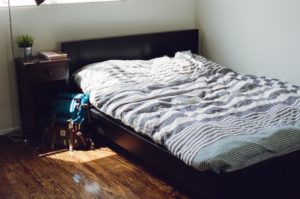How Much Sleep Do You Need?
Adults of all ages need seven and a half to nine hours of sleep every night. Your sleep patterns will naturally change as you age. Since your body is producing lower levels of growth hormone, you will also produce less melatonin. You will wake up more and not achieve deep sleep as often.
While occasional sleep problems and minor sleep quality changes are a natural part of aging, there are key signs that your sleep problems are an indication of elderly insomnia:
You can’t sleep even though you’re tired
You can’t fall back asleep when you wake up
You need medication to fall asleep
You don’t feel well-rested in the morning
You notice you have trouble focusing during the day
Why could this be happening? Here are five possible reasons:
Frequent Urination
Bladder or prostate problems could be causing a frequent urge to urinate. If you’re waking up more than three or four times every night to visit the bathroom, it’s time to see your doctor for a physical examination.
Medication Side Effects
Do you take medications that have a stimulating effect? Some antidepressants may cause elderly insomnia. Talk with your doctor about your medication schedule and see if changing the timing of your pill intake can help with your sleep problems.
Anxiety or Depression
If you are overly anxious, have a high stress level or are experiencing depression, elderly insomnia is a definite concern. Financial struggles, losing a close family member or even retiring from your job can trigger these conditions and seriously affect your sleep at night.
Lack of Relaxing Sleep Routine
Not following a regular bedtime routine can also interfere with your restfulness at night. Try to avoid eating or exercising late at night. Make sure you get enough exercise during the day to be sure your body is tired, then establish a peaceful routine before you retire for the evening. Take a warm bath, avoid alcohol and coffee and turn off electronics a few hours before bed.
Restless Leg Syndrome
Restless leg syndrome affects approximately 10 percent of the U.S. population. It’s a neurological disorder involving a constant and uncontrollable need to move the legs, and symptoms occur mostly at night. Talk to your doctor for diagnosis and treatment options.
Talk to Your Doctor
Make an appointment with your doctor if you notice signs of elderly insomnia. Identifying the root cause of the issue will be their first concern so they can form an effective treatment plan. You deserve the best quality sleep possible and you deserve the best healthcare.

